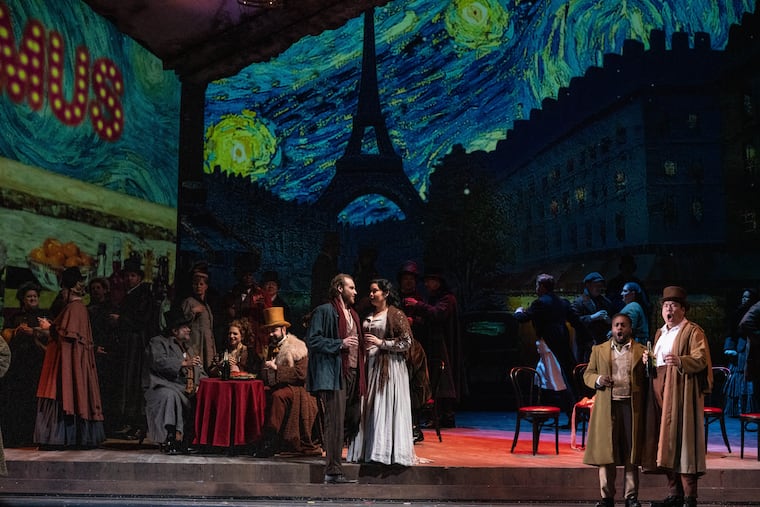In Opera Philadelphia’s new ‘La boheme,’ the Barnes and Art Museum have starring roles
La Boheme can touch something so elemental that it ceases to be something artificial happening onstage. It's your life.

In our spoiler-alert era, La boheme is miraculously immune to being spoiled, along with most other Puccini operas.
At Opera Philadelphia's revival of Davide Livermore's 2012 production on Friday at the Academy of Music, you knew early on that your favorite character, the Parisian flower seller Mimi, was doomed as she coughed uncontrollably while flirting with the tenor. But being forewarned doesn't lessen the impact when the inevitable happens some three hours later.
In a performance as good as Friday’s, that impact intensifies with age and repeated exposure to the opera. La boheme can touch something so elemental that it ceases to be something artificial happening onstage. It’s your life.
The production drew on French Impressionist paintings – thanks to the Philadelphia Museum of Art and the Barnes Foundation – that were seen on a pair of stage-filling, diagonally positioned video screens to set the scenes for 1890s Paris, where a quartet of starving, freezing artists are living a dream we’ve all had at one point or another. But that wasn’t all. Amid digitally created snow, the Act II Christmas Eve street scene at Cafe Momus had a stilt walker and pyrotechnic effects in a fun visual grab bag that included the Opera Philadelphia chorus plus Philadelphia Boys and Girls Choirs. Act III opened with the painter Marcello at his easel, first working on a darkened stage with nothing but falling snow, painting a winter landscape that, as dawn broke, became the scene’s setting on the two video screens.
But characterizations and staging – thanks to revival director Alessandra Premoli – felt so right that I often didn’t much notice the video effects after a certain point. Once the entire package occupied my psyche, all past La boheme references were pushed aside, from the modern hospital setting devised by director Stefan Herheim in Oslo to a Metropolitan Opera performance I heard with Luciano Pavarotti and Mirella Freni conducted by Carlos Kleiber.
Here’s a radical thought: Was the Opera Philadelphia performance all the more affecting because the highly capable cast didn’t have major star personalities? Without self-regarding charisma – and sense that the singers were slumming in working-class costumes – to detract from the overall ensemble? That was true from Act II on, after key cast members smartly dialed back their performances. At first, tenor Evan LeRoy Johnson (Rodolfo) had all of the right notes but needlessly pushed his voice – as if he were portraying a warrior rather than a poet. Baritone Troy Cook (Marcello) was physically fussy and hyper-reactive in ways that stole focus from his own voice, which is darker than in the past and wasn’t well matched with Johnson’s stentorian tendencies.
Among the women, Vanessa Vasquez, from Academy of Vocal Arts up the street, was an endearing Mimi with a fast vibrato used to convey great vulnerability, particularly amid her fine gradations of color and volume as life slipped out of her body in Act IV. As the flirtatious Musetta, Ashley Marie Robillard, from the Curtis Institute, sang with beauty and precision even in her most comic moments. Hers is the voice I’d most like to hear again. In secondary roles, Will Liverman as Schaunard and Peixin Chen as Colline made their silences speak powerfully in the final death scene, with Colline’s coat-pawning aria rising organically out of the opera’s fabric.
Conductor Corrado Rovaris was a key figure here, intelligently maintaining the pace of Puccini’s not-a-note-wasted score and delivering highly personal views of the orchestration. The lively opening scene was almost like a concerto for orchestra with so many incidental solos popping in and out. As the opera intensified, every scene involving Mimi had an extremely specific orchestral color that deepened the emotional situation onstage. Such things can’t really be described but only sensed.
The final irony: Friday’s performance started amid a tornado watch. But considering that the Academy of Music has been standing since 1857, the opera house was the safe place to be.
OPERA REVIEW
La boheme
Opera Philadelphia performances through May 5 at the Academy of Music, 240 S. Broad St., $25-$299, 215-732-8400, operaphila.org.